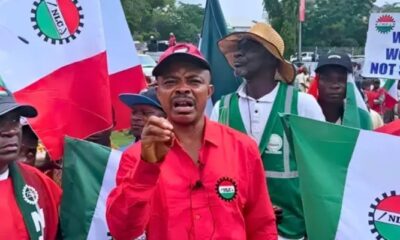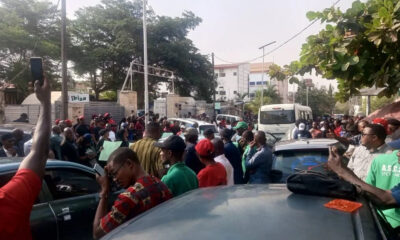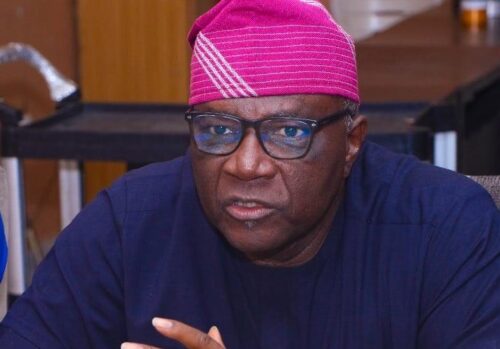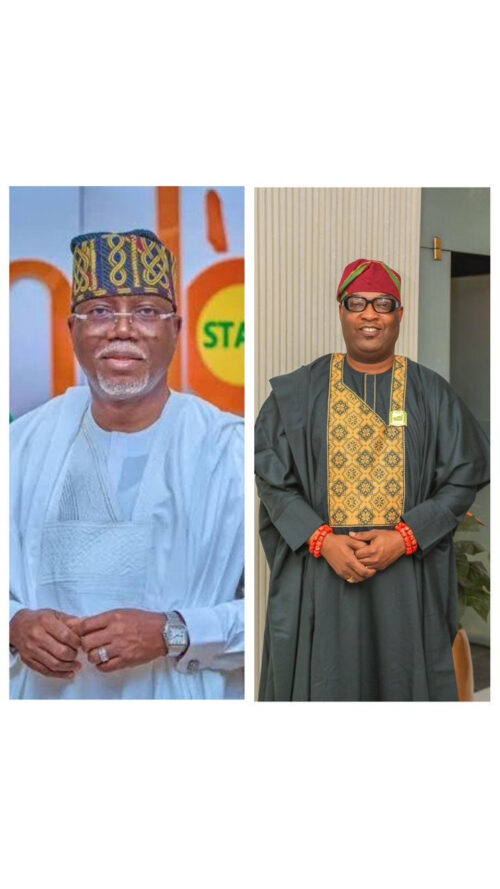- President orders minister to calculate cost, Labour gives one-week ultimatum
As the Tripartite Committee on National Minimum pay starts holding daily sessions for five days in an attempt to come to an agreement, Organised Labour may accept a minimum wage of N100,000.
According to a number of labour movement sources on Tuesday, the union officials were prepared to reconsider their demand, which they had previously raised from N494,000 to N100,000.
This was in response to the backlash and controversy surrounding their proposal, which was viewed as absurd and unfeasible.
The Minister of Information and National Orientation, Mohammed Idris, stated in a statement released on Saturday by his media assistant, Rabiu Ibrahim, that the proposed minimum wage would require an annual expenditure of N9.5 trillion, which he deemed intolerable for the country’s economy.
Despite the intervention of the leadership of the National Assembly, labour embarked on an indefinite strike on Monday, a development that grounded economic activities nationwide.
Banks, airports, public schools and courts were shut, forcing the Federal Government to convene an emergency meeting to find a way out of the impasse.
In a bid to move the negotiation forward, the unions on Tuesday announced the suspension of the industrial action for five days after President Bola Tinubu agreed to pay a national minimum wage higher than N60,000 and the tripartite committee pledged its readiness to convene daily until a new minimum wage is announced.
To show his commitment to the negotiation, the President on Tuesday directed the Minister of Finance, Wale Edun, to present the cost implications for a new minimum wage within two days.
Tinubu gave the order at a meeting with the government negotiation team led by the Secretary to the Government of the Federation, George Akume, at the Presidential Villa in Abuja.
A senior NLC official, under anonymity, confirmed that the unions would insist on N100,000 minimum wage.
He stated, “Today’s (Tuesday) meeting was essentially to set an agenda and plan how to complete the assignment within the five days.
“The government representatives did not mention a raise in the N60, 000. They just set the agenda on what to do and how to go about the negotiation. There was no mention of any increment. But labour planned to close the negotiation on N100,000 minimum wage.’’
The Deputy Head of NLC Political Commission, Prof. Theophilus Ndubuaku, also confirmed that the Tuesday tripartite meeting on minimum wage was to draw an agenda for the daily meetings.
“We met today (Tuesday) to draw up an agenda for the one-week daily meeting. We met today and drew the agenda because the agreement was that we meet daily for the meet one week and on our own, we said we are relaxing the strike not even suspending it.
“It’s more like putting everybody on red alert. It means we are not going to give any notice. Which means by this time next week, we are going on strike. There is a difference between relax and suspend. Relax is to stay on your duty post and put your hands on the trigger. It is tomorrow (today) that we are expecting the government to submit another proposal,’’ he explained.
The organised labour vowed to reject any little addition to the N60,000 offer by the tripartite committee on the new minimum wage.
The President of the Trade Union Congress, Festus Osifo, made this known on Channels Television’s Politics Today programme on Tuesday.
When asked whether labour would accept a few thousand naira additions to the offer, the TUC boss said, “No, we also told them that it’s not that we’d get to the table and you start adding N1, N2, N3,000 as you were doing and we got some good guarantees here and there that they would do something good.”
Osifo added that labour was not fixated on N494,000 as the new minimum wage for workers in the country but the tripartite committee must show seriousness and offer workers something economically realistic in tandem with current inflationary pressures.
Though the union leader refused to mention a specific amount, he said the new minimum wage must be equal in purchasing power to the value of N30,000 in 2019 and N18,000 in 2014.
But disclosing to journalists the presidential directive to the finance minister, the Minister of Information and National Orientation, Mohammed Idris, said Tinubu during the meeting directed Edun to provide the financial implications of the new minimum wage in 48 hours.
He noted, “The President has just summoned a meeting of all those who negotiated on behalf of the Federal Government led by the Secretary to the Government of the Federation. The minister of finance was there, the minister of budget planning, the minister of information, the minister of budget and national planning, the minister of labour, and the NNPCL GMD.
“We were all there to look at all issues and the President has directed the minister of finance to do the numbers and get back to him between today and tomorrow so that we can have figures ready for negotiation with labour.”
Idris assured of the President’s readiness to accept the committee’s resolutions, adding that “The President is determined to go with what the committee has said and he’s also looking at the welfare of Nigerians.
“The government is not against or opponent of labour discussions; the government is not an opponent of wage increase but what is there is that government is always there to ensure that there is a balance between what government pronouncement is and what the realities are on the ground.
“And therefore, we will work assiduously to ensure that whatever promises the government makes are promises that will be kept. That is the idea of this meeting.”
Furthermore, he said President Tinubu had directed the government representatives to work collectively with the organised private sector and the sub-nationals to achieve a new affordable wage award for Nigerians.
Idris explained, “The President has given a marching order that all those who have negotiated on behalf of the Federal Government and all those who are representatives of organised private sectors, the sub-nationals to come together to have a new wage that is affordable, sustainable and that is also realistic for Nigerians.
“The wage is not just that of the Federal Government as I mentioned earlier, the sub-nationals are involved, the organised private sector is involved; it was labour that stepped out during that procedure. Now we have come back to the negotiation table.”
The minister assured that all hands would be on deck to present a new minimum wage for Nigerians in one week.
“All of us will work together assiduously within the next one week to ensure that we have a new wage for Nigeria that is acceptable, sustainable and also realistic,” Idris said.
Meanwhile, Labour said it had “relaxed” its strike for one week to enable fruitful negotiations with the Federal Government on minimum wage.
The NLC and TUC announced this in a communique on Tuesday, after a joint National Executive Council meeting.
The suspension of the strike followed a six-hour meeting between the leadership of organised labour and the National Assembly in Abuja on Monday night.
The Federal Government had expressed the commitment of President Bola Tinubu to raising the N60,000 offered as the minimum wage.
The agreement stated, “The President of Nigeria, Commander-in-Chief of the Armed Forces, is committed to establishing a National Minimum Wage higher than N60,000; and the Tripartite Committee will convene daily for the next week to finalise an agreeable National Minimum Wage.”
The organised labour also agreed to “immediately hold meetings of its organs to consider this new offer, and no worker would face victimisation as a consequence of participating in the industrial action.”
The resolutions were signed on behalf of the Federal Government by the information, Idris, and the Minister of State for Labour and Employment, Nkeiruka Onyejeocha.
In its statement announcing the strike suspension, the unions said there was a greater need to create the right ambience for negotiation to continue unhindered.
“The indefinite nationwide strike action is, therefore, relaxed for one week from today (Tuesday) to allow the Federal Government to commit to a concrete and acceptable National Minimum Wage; take definitive steps to reverse the electricity tariff hike back to N66/kwh and abolish the discriminatory classification of electricity consumers into bands,” the unions said.
Labour also mandated its affiliate unions and state councils, to return to their respective workplaces immediately
On the issue of the electricity tariff, the unions said they were deeply disappointed by the government’s silence and lack of concrete action regarding the reversal of the electricity tariff hike and the abolition of the apartheid classification of electricity consumers into Bands.
“The NEC reaffirms that these issues are critical to alleviating the financial burden on Nigerian workers and the general populace. The electricity tariff hike and discriminatory Band classification remain unacceptable and must be addressed alongside the wage increase.”
In their position on the minimum wage, opposition lawmakers in the House of Representatives called on the Federal Government to implement a new minimum wage of more than N100,000 to assuage organised labour.
Kingsley Chinda, the Minority Leader of the House, on Tuesday, lamented the condition of the average Nigerian worker, stressing that the failure to pay a living wage is a constitutional breach.
He said, “In Nigeria today, any wage below $200 (N298,800) is ridiculous. The Nigerian worker is heavily underpaid and it is the responsibility of the government to ensure the security and welfare of its citizens. Failure to pay a living wage is unconstitutional as the welfare of citizens is neglected.
“Public and government officers should have their monthly wages while we consider the hourly rate for private or casual employees. The earlier the government concludes this matter with labour unions, the better.”
Like Chinda, a member of the Peoples Democratic Party and the lawmaker representing Obokun/Oriade Federal Constituency, Osun State, Oluwole Oke, also made a case for the payment of a living wage which he said would enable the majority of Nigerians to cope, given the current economic realities.
“The minimum wage the Federal Government should pay should be N120,000. I say this because wage increase has its linkages, effects and consequences. Nigerian workers deserve living wages,’’ he argued.
Not unaware of the challenges his proposal would attract, Oluwole who chairs the House Committee on Judiciary, urged the private sector to be taken into consideration.
“We need to look at productivity in the private sector. Would the private sector that feeds the government survive? We have a serious issue at hand,” he added.
Asked what is good enough to count as a living wage, the lawmaker representing Abuja Municipal/Bwari Federal Constituency of the Federal Capital Territory, Chinedu Obika said, “N150,000 based on the current reality.”
Obika, a member of the Labour Party, further urged the Federal Government to consider the inflation rate in the past few years, when negotiating the new minimum wage for the workers.
In a bid to resolve the impasse on the minimum wage, the Senator representing Abia North District, Orji Kalu, has proposed a new minimum wage of N90,000.
Speaking during a brief plenary session on Tuesday, Kalu said a new wage in the region of N90,000 may be enough for workers to return to their duty posts.
Following a motion moved by the Chairman of the Senate Committee on Labour and Employment, Diket Plang, Kalu urged the Senate to prevail on both parties to reach an agreement in the interest of the nation.
While calling for an end to the standoff, Kalu described the complete shutdown of the power grid by the labour unions as a “daring move” which should not have happened.
He said, “Sixty thousand might sound very good but let the entire Senate see how we can persuade both labour and the Federal Government to agree between N75,000 and N90,000
“If you go by N90,000, it means in the last five years in which this law (N30,000) was made, it means if you divide 200 per cent of N90,000 by 5, it will give you 40 per cent. The food inflation, purchasing parity and other things you have in the market are around 32 per cent to 33 per cent. So, labour should be very happy with what we are doing.
“Let us send a Senate delegation to the Federal Government and Labour with the proposal of N90,000 and all the parties should agree to that.”
The lawmaker expressed dismay over the shutting down of the nation’s power grid by the unions as part of their demands for improved wages.
“Pulling down the national grid is not an easy job and it might take up to three to four days for it to come up. Shutting down and starting a national grid is a problem.
“The Federal Government and the Labour should be cautioned to agree. Though, it’s going to be difficult for the private sector to pay, they must manage,” he said.
On his part, Senator Ali Ndume urged the Senate to collaborate with the executive arm to sponsor a bill on a new wage. to address the situation.
Also speaking, former Senate President, Ahmad Lawan urged his colleagues to be mindful of the value of the naira, noting that a new minimum wage may not have much impact on the standard of living of Nigerians.
He insisted that emphasis should be paid on strengthening the value of the naira adding that the new minimum wage will be useless if the naira continues to depreciate.
“If it is N200 to a dollar, the impact will be more on the entire Nigerians, both the employed and the non employed”, Lawan stated.
In his remarks, the President of the Senate, Senator Godswill Akpabio said though it was heartwarming that the strike had been suspended, the conduct of the unionists, he said, deserved condemnation.
“One of such excesses was the shutdown of the national grid which is more of an economic sabotage than agitation for a new minimum wage.
“Also, disruption or prevention of students from writing their West African School Certificate Examination by some labour unionists during the strike was bad because the examination is not organised by Nigeria but by West African Countries,” he said.
He also condemned the disruption of Hajj flights by the unionists, saying such a development must not occur again.
Weighing in on the matter, a former deputy governor of the Central Bank of Nigeria, Kingsley Moghalu, noted that Nigeria’s level of productivity cannot support the N494,000 minimum wage organised labour is demanding.
Moghalu disclosed this on his official X handle on Tuesday.
Moghalu said the demand is deserving but not realistic and therefore recommended a minimum wage of N75,000 to N100,000.
“In the debates on the national wage in Nigeria, we miss the fundamental point: there is little or no productivity in the economy,” he said.
“If we had a truly productive economy, there is no reason we can’t have the kind of minimum wage of N400k or N500K that Labour wants. But we can’t, because the level of productivity in the economy cannot support it. Remember, the minimum wage is not just about government salaries.
“There are not more than 2 million, at most 3m civil servants in Nigeria. It is even more about what is paid in the private sector to household staff, etc.
“All of this is why, all things considered, including avoiding a minimum wage that multiplies already ravaging inflation (assuming such a wage can even be paid), I recommend a minimum wage of between N75,000 and N100,000.”
He further explained that productivity can be achieved by human capital development and electricity, amongst others.
“In fact, speaking about productivity, how productive is an average Nigerian worker? How skilled is he or she, and thus how much value does he or she create?
“I know we are all upset at our insensitive political class, who do not care about the masses and only for themselves. But the economics of it all is far more complex.
“Sadly, it is quite obvious that the political will to reduce the waste in governance does not exist.
“Human capital development, skills that create value addition, which is economically quantifiable. Wealth creation and profitability increase. Wages go up naturally and of course, the almighty electricity,’’ he stated.
Credit: The Punch
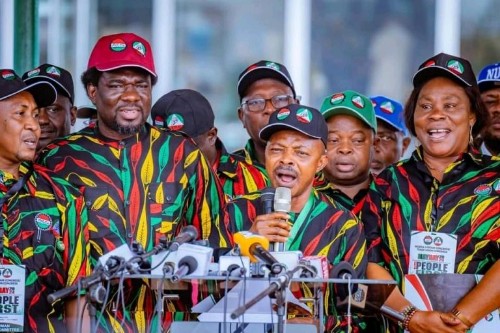

 BIG STORY3 days ago
BIG STORY3 days ago
 NEWS5 days ago
NEWS5 days ago
 NEWS4 days ago
NEWS4 days ago
 BIG STORY5 days ago
BIG STORY5 days ago
 BUSINESS2 days ago
BUSINESS2 days ago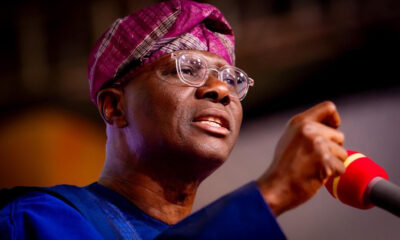
 NEWS5 days ago
NEWS5 days ago
 ENTERTAINMENT12 hours ago
ENTERTAINMENT12 hours ago
 BIG STORY3 days ago
BIG STORY3 days ago






